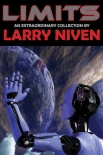Limits, Larry Niven [the best motivational books .TXT] 📗

- Author: Larry Niven
Book online «Limits, Larry Niven [the best motivational books .TXT] 📗». Author Larry Niven
That funeral damned near killed me. The kids who took me to the Moon weren’t supposed to let the ship take more than half a gravity. My bones are over a hundred years old, and they’re fragile. For that young squirt of a pilot the landing may have been smooth, but she hit a full gee for a second there, and I thought my time had come.
I had to go, of course. The records say I was Jack’s best friend, the man who’d saved his life, and being one of the last survivors of the Great Trek makes me somebody special. Nothing would do but that I push the button to send Jack on his “final spiral into the sun,” to quote a downer reporter.
I still see TriVee programs about ships “spiraling” into the sun. You’d think seventy years and more after the Great Trek the schools would teach kids something about space.
When I staggered outside in lunar gravity—lighter than the 20% gravity we keep in the Skylark, just enough to feel the difference—the reporters were all over me. Why, they demanded, did Jack want to go into the sun? Cremation and scattering of ashes is good enough for most spacers. It was good enough for Jack’s wife. Some send their ashes back to Earth; some are scattered into the solar wind, to be flung throughout the universe; some prefer to go back into the soil of a colony sphere. But why the sun?
I’ve wondered myself. I never was good at reading Jack’s mind. The question that nearly drove me crazy, and did drive me to murder, was: why did Jack Halfey make the Great Trek in the first place?
I finally did learn the answer to that one. Be patient.
Probably there will never be another funeral like Jack’s. The Big Push is only a third finished, and it’s still two hundred miles of the biggest linear accelerator ever built, an electronic-powered railway crawling across the Earthside face of the Moon. One day we’ll use it to launch starships. We’ll fire when the Moon is full, to add the Earth’s and Moon’s orbital velocities to the speed of the starship, and to give the downers a thrill. But we launched Jack when the Moon was new, with precisely enough velocity to cancel the Earth’s orbital speed of eighteen miles per second. It would have cost less to send him into interstellar space.
Jack didn’t drop in any spiral. The Earth went on and the coffin stayed behind, then it started to fall into the Sun. It fell ninety-three million miles just like a falling safe, except for that peculiar wiggle when he really got into the sun’s magnetic field. Moonbase is going to do it again with a probe. They want to know more about that wiggle.
The pilot was a lot more careful getting me home, and now I’m back aboard the Skylark, in a room near the axis where the heart patients stay; and on my desk is this pile of garbage from a history professor at Harvard who has absolutely proved that we would have had space industries and space colonies without Jack Halfey. There are no indispensable men.
In the words of a famous American president: Bullshit! We’ve made all the downers so rich that they can’t remember what it was like back then.
And it was grim. If we hadn’t got space industries established before 2020 we’d never have been able to afford them at all. Things were that thin. By 2020 A.D. there wouldn’t have been any resources to invest. They’d have all gone into keeping eleven billion downers alive (barely!) and anybody who proposed “throwing money into outer space” would have been lynched.
God knows it was that way when Jack Halfey started.
I first met Jack Halfey at UCLA. He was a grad student in architecture, having got his engineering physics degree from Cal Tech. He’d also been involved in a number of construction jobs—among them Hale Observatory’s big orbital telescope while he was still an undergrad at Cal Tech—and he was already famous. Everyone knows he was brilliant, and they’re right, but he had another secret weapon: he worked his arse off. He had to. Insomnia. Jack couldn’t sleep more than a couple of hours a night, and to get even that much sleep he had to get laid first.
I know about this because when I met Jack he was living with my sister. Ruthie told me that they’d go to bed, and Jack would sleep a couple of hours, and up he’d be, back at work, because once he woke up there was no point in lying in bed.
On nights when they couldn’t make out he never went to bed at all, and he was pure hell to live with the next day.
She also told me he was one mercenary son of a bitch. That doesn’t square with the public image of Jack Halfey, savior of mankind, but it happens to be true, and he never made much of a secret of it. He wanted to get rich fast. His ambition was to lie around Rio de Janeiro’s beaches and sample the local wines and women; and he had his life all mapped out so that he’d be able to retire before he was forty.
I knew him for a couple of months, then he left UCLA to be a department head in the construction of the big Tucson arcology. There was a tearful scene with Ruthie: she didn’t fit into Jack’s image for the future, and he wasn’t very gentle about how he told her he was leaving. He stormed





Comments (0)